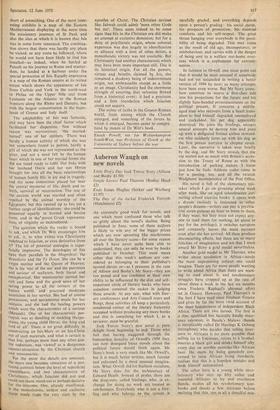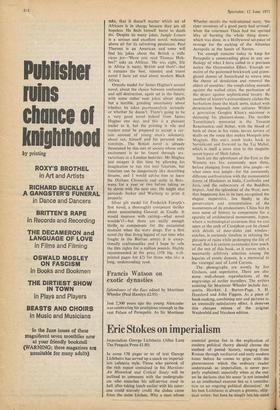Auberon Waugh on new novels
An extremely good week for novels, and one which must confound those who talk so glibly about the novel's decline. Being published in June, none of these authors is likely to win any of the bigger prizes which are now sprouting like mushrooms all over the literary scene—for some reason which I have never quite been able to understand, they can only be won by books published in October. This must mean either that this week's authors are con- sidered as belonging to their publisher's second eleven or—as presume in the case of Allison and Busby's Mr Story—they are too proud and too confident in their own ability to be influenced by the dim and self- important circle of literary hacks who have somehow cornered the racket in judging these awards. At any rate, what with liter- ary conferences and Arts Council tours and Bangs, these activities all keep a particularly untalented corner of the literary fraternity occupied without producing any more books and this is something for which I, as a reviewer, must be grateful.
Jack Trevor Story's new novel is pure delight from beginning to end. Those who feel that having staggered through the humourless banality of Orwell's 1984 they can now disregard bitter novels about the political future should think again. Mr Story's book is very much like Mr. Orwell's, but it is much better written, much funnier and enlivened by a most unusual imagina- tion. What Orwell did for Stalinist socialism, Mr Story does for the technocracy of Edward Heath. Instead of proles, there are the drop-outs, called freelings, who, in ex- change for doing no work are treated as sub-humans. Everybody who is not a free- ling and who belongs to the system is
carefully graded, and everything depends upon a person's grading: his social status, his prospects of promotion, his material comforts and his self-respect. The great threat hanging over everybody is the possi- bility of being degraded. This may come as the result of old age, incompetence, or misbehaviour, and carries with it the danger of being sent to a welfare rest-home over- seas which is a • euphemism for extermi- nation.
In fairness to Orwell, one must point out that it would be most unusual if somebody had not yet succeeded in writing a better version of 1984 by now; so many attempts have been even worse. But Mr Story some- how contrives to weave a first-class tale into his projections for the future and his slightly ham-handed pronouncements on the political present. It concerns a middle- aged man who recovers from a heart trans- plant to find himself degraded, unemployed and cuckolded, his pet dog apparently destroyed. He joins the freelings, escapes several attempts to destroy him and joins up with a disfigured former airline steward- ess who suddenly turns up with his dog as the first person narrator in chapter seven. Later, the narrative is taken over briefly by the dog, and Mr Story reveals that the rot started not so much with Britain's acces- sion to the Treaty of Rome as with the introduction of parking meters. I know just how he feels. Address codes come in for a pasting, too, and all the swinish Wedgbenn incompetence of the Post Office.
His novel is full of the elementary mis- takes which I go on groaning about week after week, like an aged schoolmaster cor- recting school exercise hooks: it opens with a dream (nobody is interested in other people's dreams—writers can pay a psychia- trist seven guineas an hour to listen to them, if they want, but they must not expect any- one to read them for nothing, let alone to pay for the privilege); it switches narrators and constantly leaves the main narrator even after she has arrived. All these produce disconcerting effects, but there are so many felicities of imagination and wit that I must award Mr Story a gold medal nevertheless.
Another gold medal to Mr Theroux, who writes about revolution in Africa—surely the most unpromising subject one could imagine. There are far more people wanting to write about Africa than there are want- ing to read about it, and revolutionary struggles have cropped up at the rate of about three a week in the last six months since Frederic Raphael's abysmal effort set in Greece. However, Paul Theroux's is the best I have read since Graham Greene and gives by far the most vivid account of the sheer hopelesSness of independent Black Africa. There are two heroes. The first is a dim, apolitical but basically kindly insur- ance salesman, in Banda's Malawi (Banda is inexplicably called Dr Hastings K Osbong throughout) who decides that selling insur- ance to Africans is no more possible than selling ice to Eskimoes, retires to a brothel, marries a black girl and drinks himself silly every day on terrible porridge-like African beer. He starts by being genuinely con- cerned 'to raise African living standards, realises that this is a hopeless mistake and finds himself nationalised.
The other hero is a young white revo- lutionary who stirs up fifty sullen and resentful Africans to try and overthrow Banda, studies all his revolutionary text- books and shoots a few Africans before realising that this, too,-is all a dreadful mis- take, that it doesn't matter which set of Africans is in charge because they are all
hopeless. He finds himself burnt to death etc. Despite its many jokes, Jungle Lovers is a serious and excellent novel, welcome above all for its refreshing pessimism. Paul Theroux is an American and some will find his jokes about the British a trifle vieux jeu—'Have you read Thomas Hob- bes?' asks an African. 'He was right, life in Africa is nasty, British and short'—but it remains the best, funniest and truest novel I have yet read about modern Black Africa.
Ormolu medal for James Hughes's second novel, about the choice between conformity and self-destruction, again set in the future, with some rather neat jokes about death but a terrible, grinding uncertainty about whether he takes psychoanalysis seriously or whether he doesn't. There's going to be a very good novel indeed from James Hughes one day, and this is a pleasant trailer to it, but the printing is vile and readers must be prepared to accept a cer- tain amount of young man's solemnity about sex, himself and his personal rela- tionships. The British novel is already threatened by this sort of society whose only excitement is to be found through sex- variations in a London bedsitter. Mr Hughes just escapes it this time by allowing his imagination to run riot into futurism, but futurism can be dangerously like describing dreams, and I would advise him to leave the Oldham Chronicle and settle in Bots- wana for a year or two before taking us by storm with the next one. He might also persuade Secker and Warburg to print it properly.
Silver gilt medal for Frederick Forsyth's first novel, a thoroughly competent thriller about assassinating General de Gaulle. It would improve with cutting—what novel wouldn't?—but there are easily enough thrills to compensate for the occasional • moment when the story drags. For a first novel (by that living legend of our time who fought in the Biafran army) it is excep- tionally craftsmanlike and I hope he sells the film rights for a million pounds. Highly recommended at the price (358 big. well- printed pages for £2) for those who like a long, undemanding read.



































 Previous page
Previous page